Some Numbers • ¼ of the population



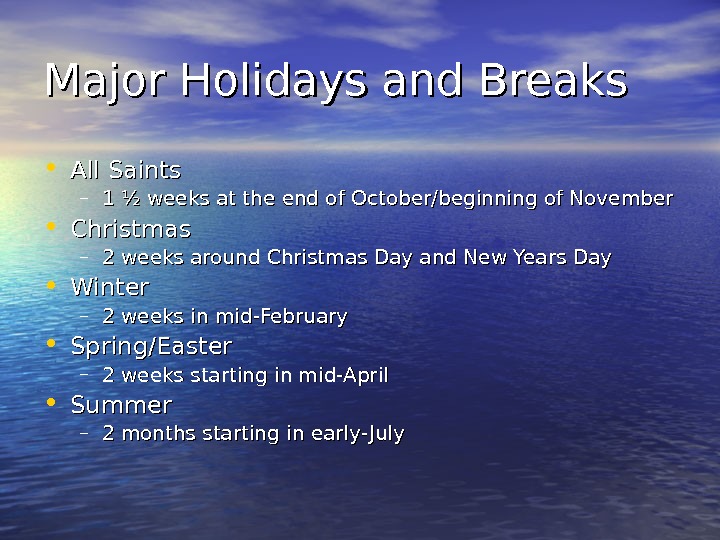

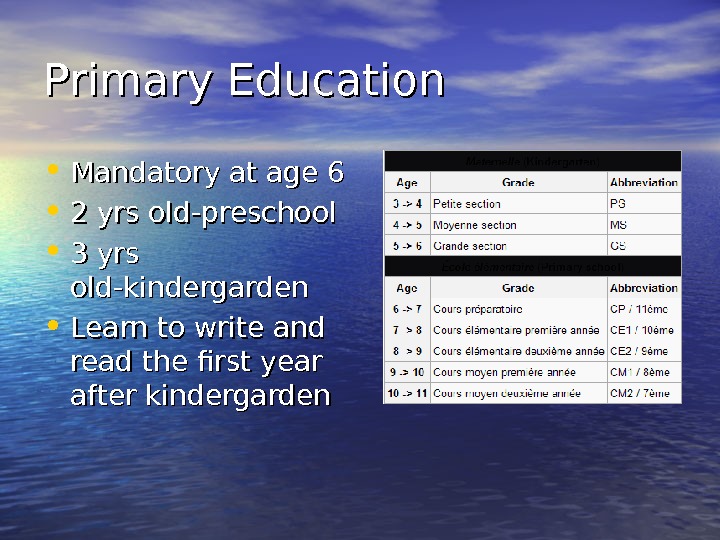


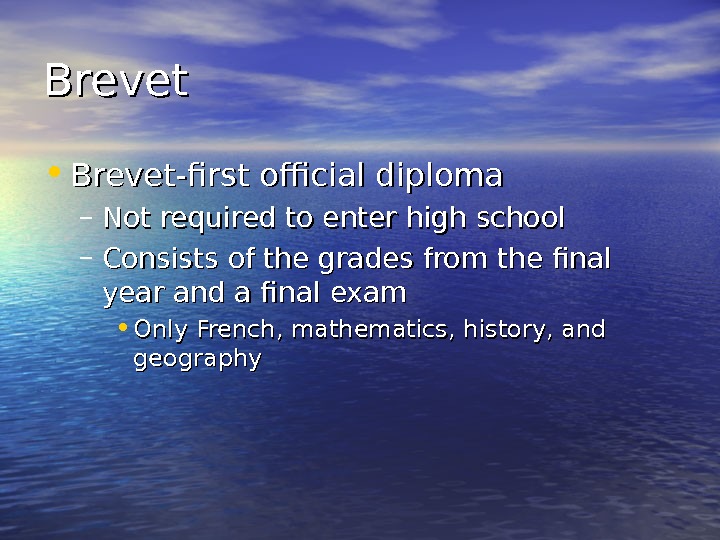
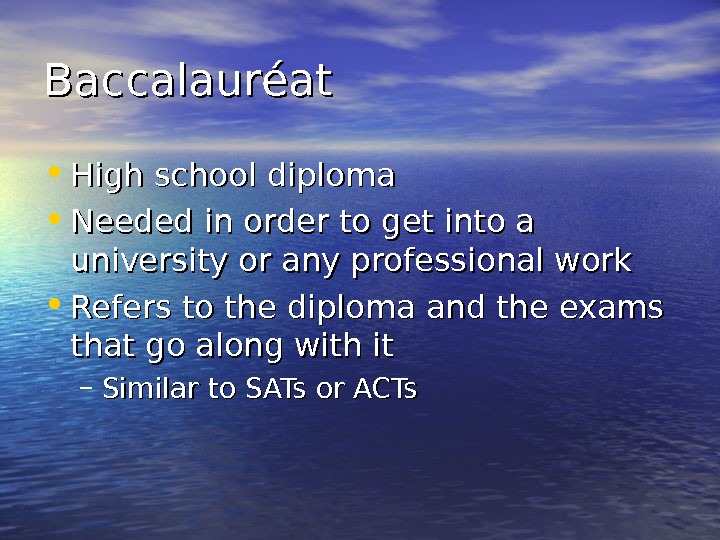

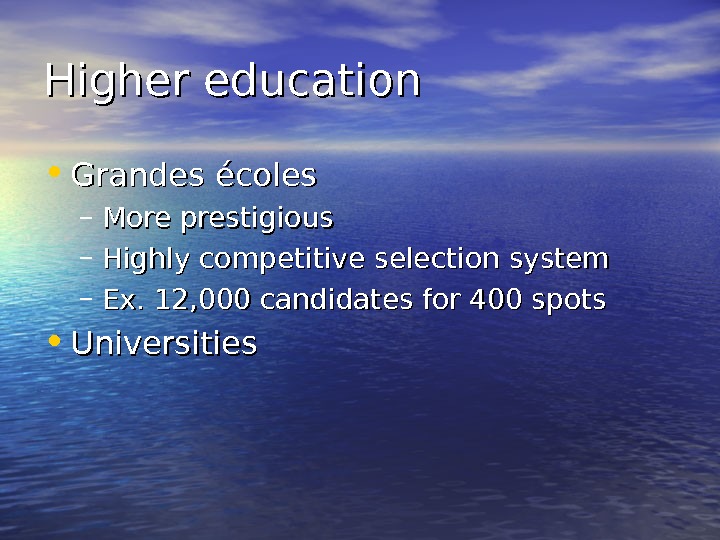
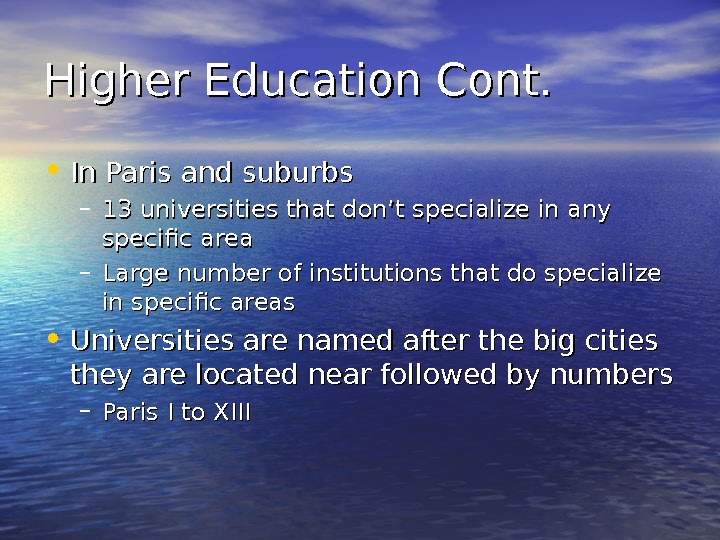
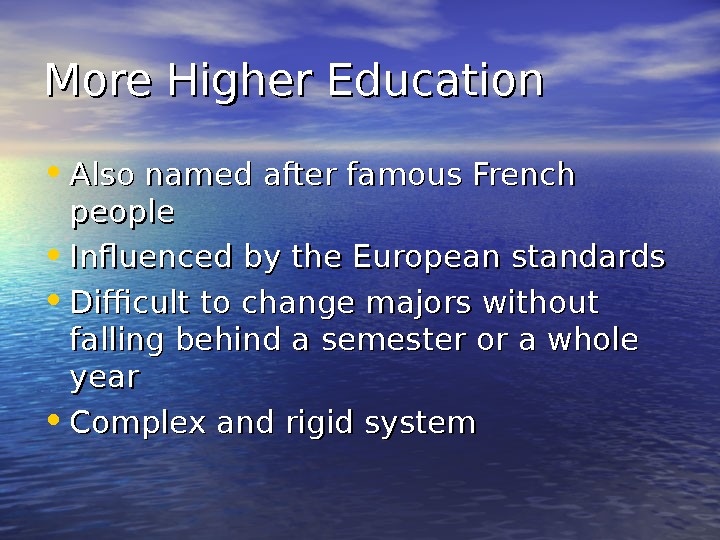

- Размер: 300.5 Кб
- Количество слайдов: 15
Описание презентации Some Numbers • ¼ of the population по слайдам

 Some Numbers • ¼ of the population is in the education system (15 million) • 2 million in higher education • 100, 000 go to schools specializing in various disabilities • 200, 000 go to agricultural or vocational schools • 300, 000 that are 16+ have work contracts
Some Numbers • ¼ of the population is in the education system (15 million) • 2 million in higher education • 100, 000 go to schools specializing in various disabilities • 200, 000 go to agricultural or vocational schools • 300, 000 that are 16+ have work contracts
 French Education • Primary education – Ages 3 -11 • Secondary education – Ages 11 -18 • Higher education – 18+18+
French Education • Primary education – Ages 3 -11 • Secondary education – Ages 11 -18 • Higher education – 18+18+
 Major Holidays and Breaks • All Saints – 1 ½ weeks at the end of October/beginning of November • Christmas – 2 weeks around Christmas Day and New Years Day • Winter – 2 weeks in mid-February • Spring/Easter – 2 weeks starting in mid-April • Summer – 2 months starting in early-July
Major Holidays and Breaks • All Saints – 1 ½ weeks at the end of October/beginning of November • Christmas – 2 weeks around Christmas Day and New Years Day • Winter – 2 weeks in mid-February • Spring/Easter – 2 weeks starting in mid-April • Summer – 2 months starting in early-July
 Pre-School • Not mandatory • Very popular • Ages 3 to 5 • Also known as nursery classe
Pre-School • Not mandatory • Very popular • Ages 3 to 5 • Also known as nursery classe
 Primary Education • Mandatory at age 6 • 2 yrs old-preschool • 3 yrs old-kindergarden • Learn to write and read the first year after kindergarden
Primary Education • Mandatory at age 6 • 2 yrs old-preschool • 3 yrs old-kindergarden • Learn to write and read the first year after kindergarden
 Primary Education cont. • Set up similar to our elementary school – 1 or 2 teachers for numerous subjects • Don’t teach religion • Teach about the Republic instead • March 2004 -government banned all conspicuous religious symbols from school and other public institutions
Primary Education cont. • Set up similar to our elementary school – 1 or 2 teachers for numerous subjects • Don’t teach religion • Teach about the Republic instead • March 2004 -government banned all conspicuous religious symbols from school and other public institutions
 Secondary Education • Collège (high school) for the first 4 years right after primary school – Ages 11 -15 • Lycée (high school-preparing for college) for the next 3 years – 15 —
Secondary Education • Collège (high school) for the first 4 years right after primary school – Ages 11 -15 • Lycée (high school-preparing for college) for the next 3 years – 15 —
 Brevet • Brevet-first official diploma – Not required to enter high school – Consists of the grades from the final year and a final exam • Only French, mathematics, history, and geography
Brevet • Brevet-first official diploma – Not required to enter high school – Consists of the grades from the final year and a final exam • Only French, mathematics, history, and geography
 Baccalaur éatéat • High school diploma • Needed in order to get into a university or any professional work • Refers to the diploma and the exams that go along with it – Similar to SATs or ACTs
Baccalaur éatéat • High school diploma • Needed in order to get into a university or any professional work • Refers to the diploma and the exams that go along with it – Similar to SATs or ACTs
 Secondary Education cont. • During the final year of collège , , students are allowed to pick some of their subjects • Also get to pick what direction they want their curriculum to take • For lycée students can either choose to go to a general, technical, or vocational schools • Prepares students for baccalaur éat exams taken when
Secondary Education cont. • During the final year of collège , , students are allowed to pick some of their subjects • Also get to pick what direction they want their curriculum to take • For lycée students can either choose to go to a general, technical, or vocational schools • Prepares students for baccalaur éat exams taken when
 Higher education • Grandes écoles – More prestigious – Highly competitive selection system – Ex. 12, 000 candidates for 400 spots • Universities
Higher education • Grandes écoles – More prestigious – Highly competitive selection system – Ex. 12, 000 candidates for 400 spots • Universities
 Higher Education Cont. • In Paris and suburbs – 13 universities that don’t specialize in any specific area – Large number of institutions that do specialize in specific areas • Universities are named after the big cities they are located near followed by numbers – Paris I to XIII
Higher Education Cont. • In Paris and suburbs – 13 universities that don’t specialize in any specific area – Large number of institutions that do specialize in specific areas • Universities are named after the big cities they are located near followed by numbers – Paris I to XIII
 More Higher Education • Also named after famous French people • Influenced by the European standards • Difficult to change majors without falling behind a semester or a whole year • Complex and rigid system
More Higher Education • Also named after famous French people • Influenced by the European standards • Difficult to change majors without falling behind a semester or a whole year • Complex and rigid system
 • Low tuition because they are funded by the state • Grandes écoles are very prestigious • Responsible for many of France’s scientists and executives
• Low tuition because they are funded by the state • Grandes écoles are very prestigious • Responsible for many of France’s scientists and executives
